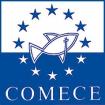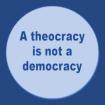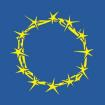 To cut off human rights at source, religious lobby targets Europe from two sides
To cut off human rights at source, religious lobby targets Europe from two sides
In a pincher movement, clerics use their right of prior “consultation”, to influence the laws of the EU, while organised grassroots campaigns to put voting pressure on EU lawmakers. However, “far too often, these religious lobbies do not accurately represent the interests or beliefs of a majority of adherents to their faith, nor do they promote the common good.” A revealing example of Vatican manipulation was its skillful effort to delay Turkey's attempt to join the EU.
The Vatican City State is not a member of the Europen Union, nor could it be. That would require signing on to a list of human rights, some of which conflict with Catholic doctrine. However, this doesn't keep the Vatican from trying to exert influence on the EU in any way it can. Its two main methods are to lobby EU lawmakers directly, and apply indirect pressure on them through grassroots campaigns in member states with large numbers of Catholics.
But it's ready to use other means, as illustrated by its two-pronged attempt in 2003 to delay Turkey's admission until it had time to make the EU sound like a Christian club.
(See also the infographic: The European Court of Human Rights: What it does, who it protects, why it matters.)
♦ Clerics demand input in EU laws: text from the CEC and COMECE (2002)
♦ Vatican tells Turkey not to rush into EU membership (2003)
♦ Catholic bishops demand still more: text from COMECE (2007)
♦ Clerics want more influence on all EU agencies: text from CEC and COMECE (2010)
♦ Council of Europe endorses “religious exemption” from human rights (May 2010)
♦ “Conscientious objectors” block protection of legal healthcare for women (October 2010)
♦ Vatican starts using powerful new European petition procedure (2012)
♦ The need for a secular voice in the European Union (2010)

Only those at the three podiums have been elected, yet the rest
claim that giving them privileges can “bring the Union closer to its citizens”.
European Commission President Barroso (centre) justifies allowing clerics
to influence European social policy by citing the churches’
“long-standing experience in social work”. True, this goes back to
the Middle Ages, but can he really claim that it’s better than services
run by the state? The Magdalene laundries show what can happen when
social work is devoted to rooting out “sin”.
Clerics have insisted on being consulted at the highest level of the European Union. Clerics of all faiths set out their demands in 2002, then Catholic bishops revealed further aims in 2007 and finally, two years later, when the Lisbon Treaty amended the constitution of the EU, their consultations became an official dialogue.
The push is on for influence in the European Union because in critical areas EU directives these now supercede national legislation. These areas include religion or belief, and discrimination on grounds of sexual orientation. For instance, in 2010 the religious lobby managed to water down an attempt in the Council of Europe to ensure that human rights are interpreted to include homosexuals and the next year it passed a resolution condemning sex-specific abortion which the pro-lifers hailed as the thin edge of the wedge.
National legislation no longer counts here. As an expert on the EU has said, "The Vatican understood this a long time ago and successfully convinced the governments of Poland, Malta and Ireland to negotiate specific protocols guaranteeing that issues related to morality, such as abortion, would remain a national matter and could never be influenced by EU level decisions." These reservations to their accession treaties have prevented Poland, Malta and Ireland from ceding their sovereignty to Europe in this area.
The clerics' privileges are based on new rules for the European Union. Article 17 of the Lisbon Treaty of 2009 reads as follows:
- The Union respects and does not prejudice the status under national law of churches and religious associations or communities in the Member States.
[This cements privileges already given to religious organisations at the national level and very much lessens the chance of a successful challenge in an EU court.] - The Union equally respects the status under national law of philosophical and non-confessional organisations.
[This is a sop to some of the potential opponents of this measure. It omits the phrase inserted for religions, “and does not prejudice”. This may be an admission that the non-religious organisations don't have any status worth protecting.] - Recognising their identity and their specific contribution, the Union shall maintain an open, transparent and regular dialogue with these churches and organisations.
[The phrases “open” and “transparent” were another sop, with no move to give these teeth. What's important is that the clerics get “regular”, in other words institutionalised, lobbying access. Notice that it does not say “formal” which means that, according to informed sources, no minutes are kept and attempts even to establish the frequency of meetings and attendees have been resisted by the European Commission.]
This “regular dialogue” is being taken to mean that the clerics should have privileged access to the European Commission which is the executive of the European Union. Under cover of this the clerics, both Catholic (COMECE) and non-Catholic (CEC) have demanded a special “pre-legislative consultation procedure”, regular “dialogue seminars” with the closest advisors to the Commission president, and a “liaison office ... in the [EU Commission] Secretariat General” that would be informed about all “legislative and political initiatives” where the churches might wish to have a say. These targets — and others, such as how to “more closely define” (get around?) the requirement that the dialogue with the EU be “open” and “transparent” — are set out in the text by the Catholic bishops below. In effect, the Vatican is demanding from the European Union still more than it does from the United Nations, where even its enhanced observer status is accompanied by no demand that it be consulted about legislation in advance, as is the case for the EU.
There is a good summary of the clerics' step-by-step infiltration of the European Commission in “The Churches’ Campaign for Special Rights in the EU”. However, the humanist authors (characteristically) plead for “state neutrality” which means that they would get their own share of state funds. Unlike secularists, they do not insist on “church-state separation”, because this would oblige everyone to pay their own way.
Another development in the infiltration of European human rights bodies is the first appointment by the new president of the Organization for Security and Cooperation in Europe (OSCE) whose remit includes gender equality, human rights, media freedom and tolerance and nondiscrimination. In order to combat discrimination in Europe a “Catholic activist” has been appointed, “whose proclaimed goal in public life is to spread the social doctrine of the Catholic Church”.
A further way the European Commission can be subjected to religious pressure is by way of the new petitioning procedure, due to come into effect in 2012. (See “Pro-Lifers Plan to Use Lisbon Treaty Innovation”.)














